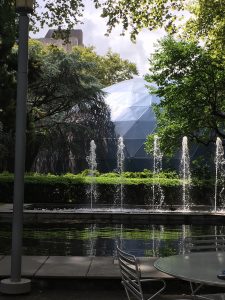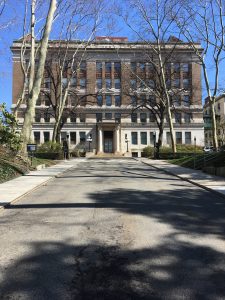Sarah Baker
A few weeks ago, I earned the opportunity to defend my thesis, the terminal task in receiving my Ph.D. While everyone’s path is different, the journey for me has been a rollercoaster of both academic and emotional development, and I’d like to reflect on what the process has taught me.


It’s okay to feel lost at times.
I started my graduate school journey knowing that I wanted to study neuroscience, but I had very little experience in the field. Most of my research as an undergraduate was done in a physical inorganic chemistry lab, so I lacked the basic textbook knowledge of the neuroscience field. Getting up-to-speed was daunting, and it felt like many of my colleagues came into graduate school with a much better understanding of these fundamental concepts than I had. I spent my evenings those first couple of months reading textbooks and watching videos online. I wish I had known that what I would learn in the lab in the process of doing research was going to be more valuable than any chapter of a textbook that I had read.
Graduate school can feel lonely, but you are not alone.
Moving to a new city and starting at a new institution where you don’t know anyone can feel overwhelming. You lose the camaraderie that naturally develops in high school and college when your whole class is studying for the same test and seeing each other regularly. The pressures of graduate school can add another dimension to feelings of isolation. While you interact with lab members and collaborators, the process of working on a Ph.D. is largely supposed to be your own—your own project, your own body of work. Everyone feels imposter syndrome at one time or another (or maybe even constantly). Once I realized that everyone else was also going through their own unique challenges, or maybe even many of the same ones I was, I stopped thinking of graduate school as a solitary pursuit. I began to reach out to others. Daily coffee breaks with friends and colleagues to talk about our highs and lows became crucial to building a sense of community.
Self-care is important.
Graduate school is full of pressure, either self-imposed or loaded on by mentors, competitors, and colleagues. For some, this may develop into feelings of having to constantly be in the lab to be productive. But as I have seen both with myself and classmates, this oftentimes leads to burnout. The rest of life does not stop just because you are now a graduate student. Make time to cook yourself a good meal and spend time with your friends and significant other. And don’t be afraid to make time for yourself. For me, I was most productive in the lab around the time that I became involved in more groups on campus and began training for a triathlon. My busier schedule meant that everything I did each day in the lab was more structured, as I needed to make the time for the things I enjoyed outside of the lab. Growth in graduate school is not limited to cognitive and academic growth, but can expand to other aspects of your life, as well. During the course of my Ph.D., some of my new experiences included travelling to three new countries, learning how to play volleyball better than I ever had in high school, teaching myself how to knit, and rekindling my love of reading and writing. I would encourage any other student to expand on an old hobby or something they have always wanted to do simultaneously with progressing on their thesis project.
Thank your people.
Getting good grades in high school and college largely comes from your own study habits and hard work. In graduate school, success not only comes from effort, but also from the insights and advice of colleagues and the support system that gets you through those hard days. Thank the people who help you along the way. And ask for help when you need it. Although no one in my family is in science, they have remained steadfast in their support of all my pursuits. My friends, both at Rockefeller and outside of the university, are the people who lift me up just by being there. Small gestures can show your support system that you are grateful.
You will find a new way to see the world.
It is impossible to complete a Ph.D. without learning something along the way. I have a new appreciation for the complexity of the dysregulation of immune processes that happen in Alzheimer’s disease, the topic of my thesis project. I learned new methodologies and improved my ability to critically evaluate both my own experiments and those published in the scientific literature. But more than that, I have a newfound admiration for the process of science—this deeper understanding could only happen by being a part of the process myself.
I came into my Ph.D. having no career plan in mind, but came out the other end realizing the strengths I could pull together to have a successful career in medical communications. I recognized that my favorite parts of the Ph.D. were the times when I was writing and critically evaluating data—developing my thesis research proposal, working on grants, and authoring papers. I feel lucky that these experiences prepared me for an internship and new career at a medical education company.
Beyond my professional growth, the process of graduate school has made me more confident in speaking up, fighting for what I care about, and being resilient when things do not go as planned. Despite beginning my Ph.D. with so much uncertainty and doubt, I have only become increasingly happy that I followed through with this pursuit. To any new graduate students out there, hang in there. The path is certainly a winding one with many peaks and valleys along the way. But try to savor the journey and keep moving forward. The trek will set you up to better face challenges for the rest of your life.

